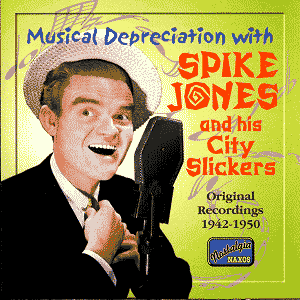 CD Reviews
CD Reviews MusicWeb
Webmaster: Len Mullenger
Len@musicweb.uk.net
[Jazz index][Purchase CDs][ Film MusicWeb][Classical MusicWeb][Gerard Hoffnung][MusicWeb Site Map]


Original recordings 1942 - 1950
Little Bo-Peep Has Lost Her Jeep (1942)
Hotcha Cornia (Black Eyes) (1942)
Clink, Clink, Another Drink (1942)
Siam (1942)
Pass the Biscuits Mirandy (1942)
Der Fuerhrer’s Face (1942)
Chloe (1943) (live broadcast performance introduced by Bob Hope)
Cocktails for Two (1944)
You Always Hurt the one you Love (1945)
The Glow Worm (1946)
That Old Black Magic (1945)
Laura (1946)
My Old Flame (1947)
William Tell Overture (1947)
Ya Wanna Buy a Bunny (1949)
Spike Jones describes the musical instruments used in Dance of the Hours (1949)
Dance of the Hours (1949)
Riders in the Sky (1949) (original uncensored ending)
Yes! We Have no Bananas (1950)
Holiday for Strings (1944)
Transfers by David Lennick. Digital Noise Reduction by Arthur Ka Wai Jenkins
78 rpm originals provided by David Lennick, Dave Gormick, and David Jessup
Crotchet Budget price
Comparison Recordings:
The Best of Spike Jones BMG 53748-2
Spiked! The Music of Spike Jones Catalyst 09026-61982-2
If you don’t know what this music is, no description I can think of will suffice. These were originally 10" single 78rpm records and when I was five years old and above they were my introduction to the concept of satire, more commonly known as spoof. I listened to them over and over again and laughed myself sick each time. After that I would sit and marvel at the multilayered humor and the many cute little jokes in the background that were thrown away. I mention the names of the collectors above in amazement at their self control because almost everybody else played and played their copies till they were completely worn out and unlistenable.
Lindley Armstrong ‘Spike’ Jones was born in 1911 and grew up in the desert towns of California where his father worked for the railroad. He probably knew my grandfather who (when he was sober) was railroad telegrapher at Amboy. Like many comedians his off mike jokes were not always funny and like many successful people he pushed his way past others some times. But his generosity to his band members was legendary; he may have hogged the limelight, but he didn’t get rich at their expense. Clearly his first big hit, Der Fuehrer’s Face was not all that funny but it went with the sentiment of the times perfectly and from then on Spike was a household word. The humor on most of these disks seems to be so quintessentially American, lower middle class working man American at that, that I don’t see how they could be fully appreciated in other countries, and I suspect they aren’t, but Der Fuehrer’s Face was a universal sentiment. Hitler must have had special plans for the City Slickers if he ever caught them; fortunately for us all he never did.
Some of Jones’ jokes were pretty old. Probably his masterpiece, Cocktails for Two makes reference to the end of Prohibition more than ten years after the fact. The Dance of the Hours is a spoof of Disney’s Fantasia eight years after the film was released, but not so long after it eventually circulated to the cheap movie houses where Jones’ core audience would see it. My Old Flame parodied the Peter Lorre horror movie persona which was at least ten years old in 1947, although those old movies ran constantly at neighborhood movie houses and were always new to each generation. The Russian gypsy song Dark Eyes (Otshi tshornye) was hardly new in 1942 (the tune was first heard about 1800, and the usual lyrics are by K. P. Grebenko). When these records were played on the radio they were never announced; at first you just might think you were hearing the original song, but once things warmed up and got going there was no need to acknowledge who it was.All the cigarette jokes were the same, a gut-wrenching, wheezing cough, a sad premonition of Jones’ death at 53 from emphysema.
When they just played the music, the City Slickers were a sort of zany Chicago Style Dixieland band. But they carried their impressive array of noise makers and Spike’s famous washboard with squeeze bulb auto horns (talk about an old joke) with them and actually did these numbers live over and over again exactly the same way hundreds of times before live audiences and on the radio.
These disks have been previously issued at higher prices on BMG CD’s, and one asks if these transfers from production pressings are as good as the ones from the BMG vault originals. As with most Naxos historical reissues, the answer is generally yes, overall. There’s more background noise in this Cocktails, but also a little more highs than on BMG 53748-2, which also has some hum but no more bass. William Tell Overture on this disk is a different ‘take’ than on BMG 53748-2, although you do have to listen pretty carefully to notice. This version of Chloe is an air check and in addition to the introduction has a laugh track and a little more background noise overall. Since the ‘originals’ were acetate transcriptions that had to be played over and over again to make new pressing masters, a mint copy early production pressing might actually sound brighter than the ‘master’ in the vault, which has probably by now long been replaced with a tape dub.
Unique to this collection are Siam, Ya Wanna Buy a Bunny, and Little Bo-Peep Has Lost her Jeep; missing from this collection are None but the Lonely Heart, Hawaiian War Chant, The Man on the Flying Trapeze, Red Wing, Deep Purple, Serenade to a Jerk, Knock Knock Who’s There, and some others that us completists could hardly live without. If after devouring this collection you find you must have more, the disk numbers are given above. Happy Hunting!
Paul Shoemaker